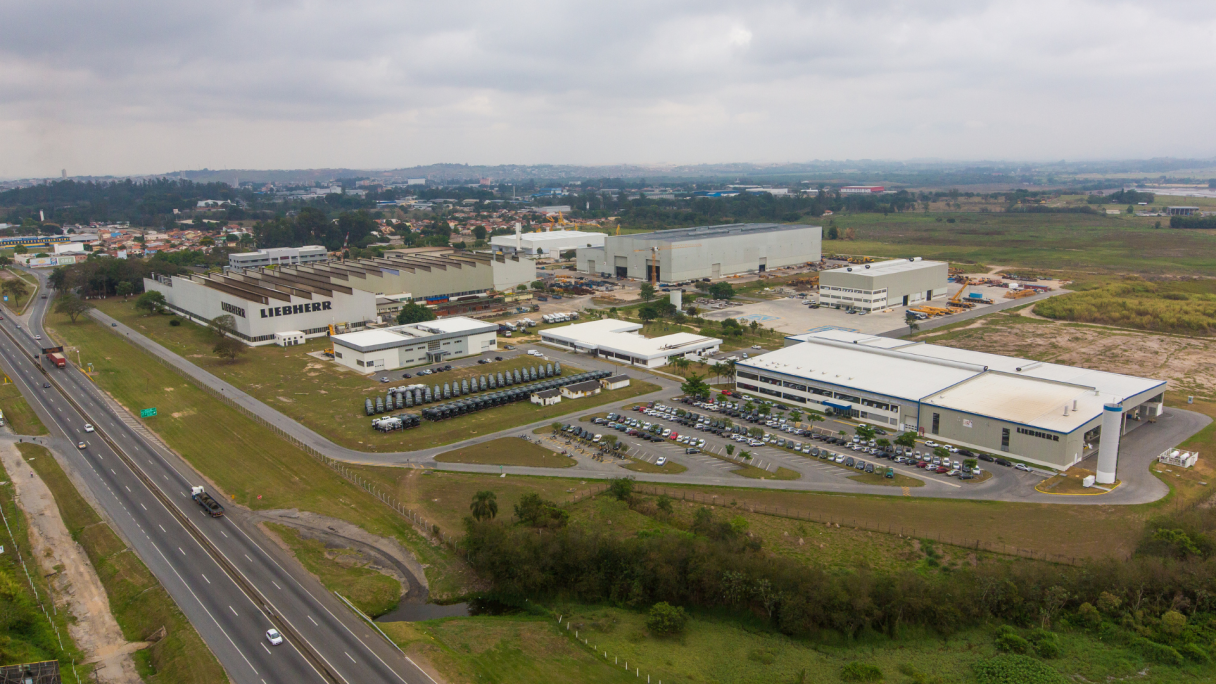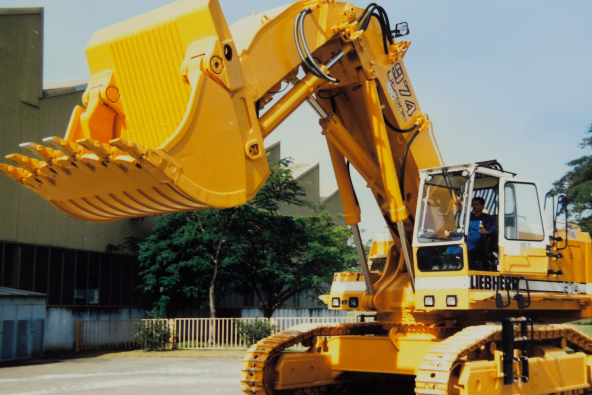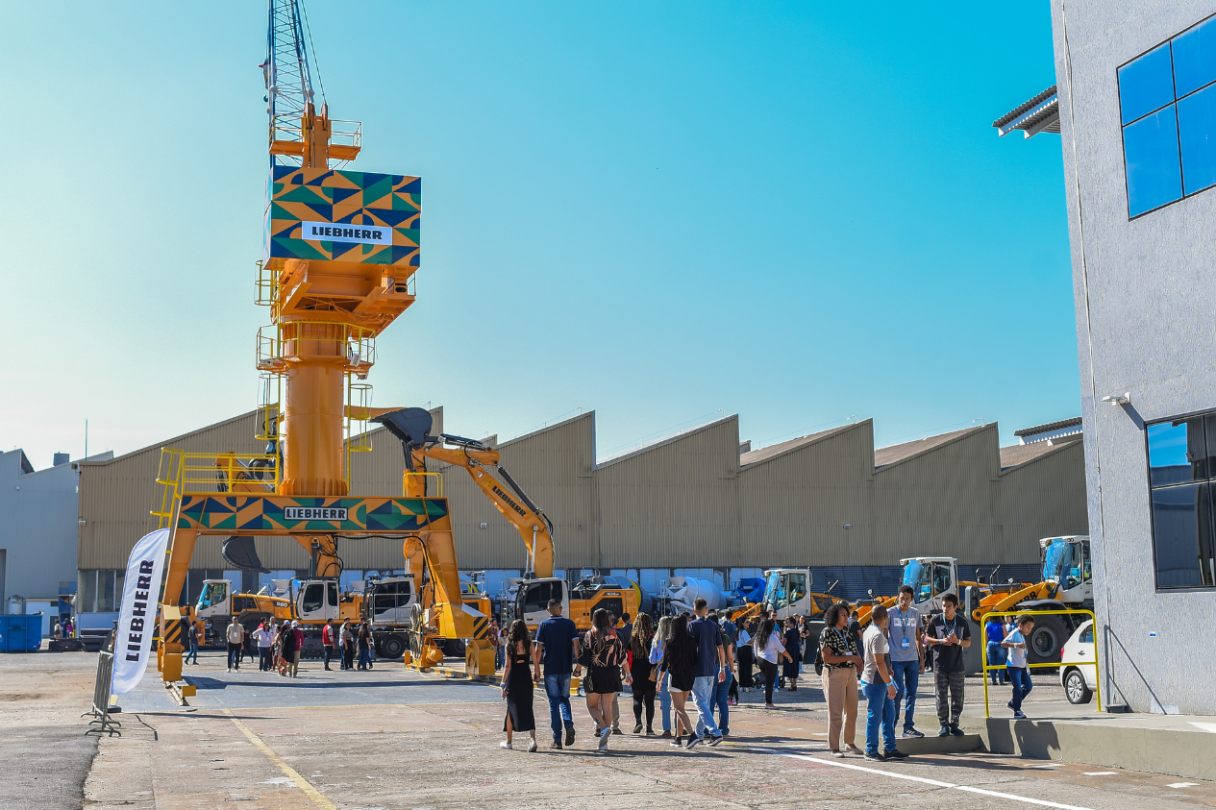When Liebherr Brasil LTDA (Liebherr Brasil) was founded, the company initially produced ship cranes. At the time, Brazil’s shipbuilding industry was experiencing incredible growth to accommodate the increasing demand for ships due to international trade. Government incentives were offered to both domestic and international companies investing in shipbuilding infrastructure as a way to meet this demand. Liebherr wanted to establish itself as a reliable partner for Brazil’s burgeoning maritime fleet and so, Liebherr Brasil was born.
However, as time progressed and the economic cycles of Brazil changed, the needs of the Brazilian market changed. And time and again over the past five decades, Liebherr Brasil has evolved to better support the country’s needs. By the end of the 1970s, Liebherr Brasil had begun producing tower cranes to support the growing number of large infrastructure projects in the country. The following decade saw an expansion into the construction, earthmoving and mining industries. At the beginning of the new millennium, Liebherr Brasil began producing complex componentry for the aerospace industry to support what is now the largest aviation market in the Latin American and Caribbean region. And in the 2010s, Liebherr Brasil started manufacturing components for Brazil’s impressive wind power market. Liebherr Brasil prides itself on understanding the needs of its community and ensuring that it can offer exactly what the market requires.

Weathering the storm
For Liebherr Brasil to be celebrating its 50th anniversary is no small feat. The past 50 years have brought many successes and impressive achievements for the company, but those years have not been without their challenges. Brazil has experienced significant economic uncertainty a number of times since Liebherr Brasil’s founding in 1974. But it is the company’s ability to adapt and change, as well as the strong support from the Liebherr Group itself, that helped the business to survive these hard times.

The 1980s in Brazil, along with other Latin American countries, are often called ‘the lost decade’. During this time, Brazil experienced hyperinflation, economic stagnation and untenable foreign debt. Liebherr Brasil, like most other companies in the country during this time, struggled to overcome these difficulties. To survive, the company needed to repurpose its existing resources in order to appeal to as many businesses as possible. Liebherr Brasil’s highly skilled technicians across all business areas were sent out to provide a range of services for an even wider range of industries. Some of these services included adapting a dredge for Brazil’s tropical weather in Minas Gerais and updating the technology and electronics used in Santos’ harbour systems. Being able to diversify the services Liebherr Brasil offered is what helped the company to make it through the lost decade.
Unfortunately, in 2014, Brazil experienced more economic turmoil. A combination of national and international factors – including a decline in commodity prices, high inflation and increased interest rates – led to one of the worst recessions in Brazil’s history. Liebherr Brasil’s expansion into component production for the wind industry helped the company pull through this period. Brazil built 95 new wind farms in 2014, totalling 2.5 gigawatts of power, thus increasing the demand for wind farm componentry. Liebherr Brasil was able to help the industry meet this demand and therefore was able to withstand the challenges of this time.
Liebherr in Brazil today
Today, Brazil is a major player in many of the industries in which Liebherr is established. In fact, Liebherr in Brazil is one of the largest markets for the entire Liebherr Group. Brazil is the largest aviation market in Latin America, one of the top five mineral producers in the world, and one of the top ten wind energy powers globally. Liebherr in Brazil provides a range of goods and services for these industries with a workforce of more than 1,400 people. The company not only manufactures equipment and components for Liebherr’s earthmoving, mining, components, aerospace and transportation product segments, but also offers sales and support services for all Liebherr equipment sold in the country – whether it is produced in Brazil or imported from elsewhere.
The mining industry in Brazil is vital, making up 2–4 % of the country’s gross domestic product. But it’s also important for the world at large. Besides being the fifth largest producer of mineral commodities, Brazil is also the second largest producer of iron ore and is a market leader in the production of gemstones, gold, bauxite, tin, manganese, quartz and niobium. As such, Liebherr’s mining product segment is a vastly important part of Liebherr Brasil and has been for many decades. In the 1980s, Liebherr Brasil began manufacturing one of Liebherr’s earliest electric excavators: the 150-tonne R 991 E. This innovation was hugely beneficial for the reduction of greenhouse gas emissions and also helped with the logistics and availability of fuel on site. Liebherr’s smaller class excavators, like the R 9100, are still well received by the Brazilian market today – and not just by the mining industry! The R 9100 is also used in heavy construction applications like hydroelectric power plants and large logistics centres – any projects where a large volume of material must be moved in a very short time. Liebherr’s R 9250 excavator was, and continues to be, a success for medium-sized mines in Brazil. Three of these 250-tonne excavators are actually the longest serving machines of their kind in the world, reaching approximately 70,000 service hours in 13 years of operation! However, as is the norm for Brazil, the needs of customers are changing and businesses have recently expressed interest in Liebherr’s mid-range excavators, such as the R 9400, for high-volume mining projects as a way to increase onsite capacity.
Liebherr Brasil is also a key manufacturing support for Liebherr’s mining product segment internationally. The company has a dedicated manufacturing team of around 50 people responsible for building the chassis for the T 264 haul truck, the fuel tanks and the hydraulic tanks for the T 284 haul trucks and the booms and sticks for both the R 9350 and R 9400 excavators. Since 2019, Liebherr Brasil has manufactured more than 90 T 264 chassis and over 42 booms and sticks for the R 9350 and R 9400. These components have been used for Liebherr machines all over the world.
Celebrate good times
In June, Liebherr Brasil marked its 50th anniversary with a huge two-day event, celebrating with the people who made the past five decades possible: customers, business partners, employees and employees’ families.
On the first day, more than 300 of Liebherr Brasil’s customers and business partners joined politicians and high-ranking officials from the wider Liebherr Group for the festivities at Liebherr Brasil’s facilities. The opening ceremony began with Brazilian music performed on empty oil drums and tool carts, inspired by the long-running Broadway musical, STOMP. Jan Liebherr, the president of the administrative board of Liebherr-International AG, then gave a speech and was recognised by the municipality of Guaratinguetá as a citizen of the region. All the guests were invited to a facility and exhibit tour. As Liebherr Brasil’s facilities are so diverse, visitors were given the choice of walking around the production lines for the earthmoving and concrete technology products; the production line for Liebherr’s components, remanufacturing facilities for gear technology and a quick tour of the aerospace
department; or, as a third option, a complete tour of Liebherr-Aerospace Brasil.
On the second day, Liebherr Brasil opened its doors to employees and their loved ones, resulting in an impressive group of nearly 5,000 visitors. The Liebherr Brasil team was able to share the facilities and products they work with every day with their families and every visitor was given a Liebherr badge so they could feel like part of the team themselves.

